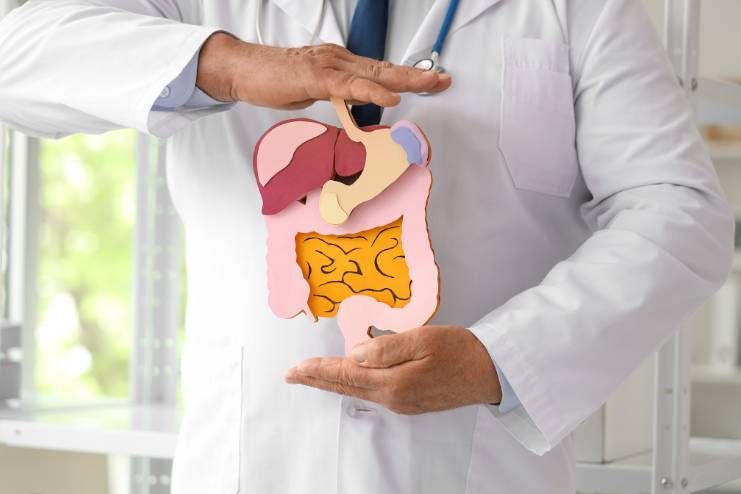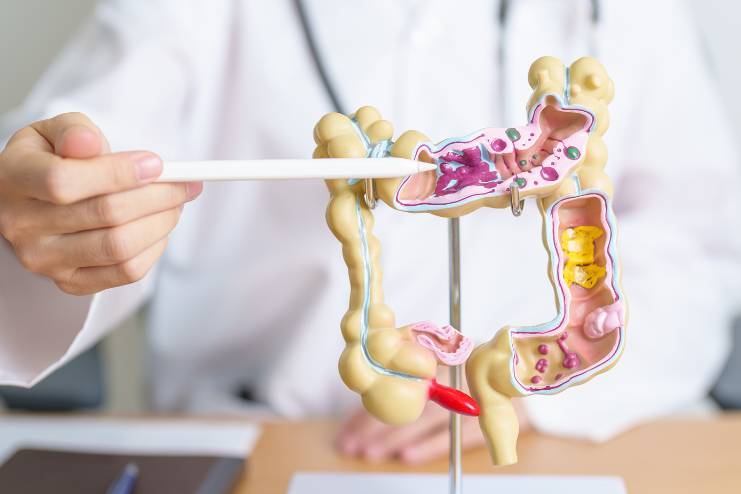Affiliate Disclaimer
Some links in this article are affiliate links. We may earn a small commission if you make a purchase through these links, at no extra cost to you. We only recommend products we find useful to our readersDiverticulosis affects more than 30% of U.S. adults between the ages of 50 and 59 and over 70% of those older than 80. Although diverticulosis itself often remains asymptomatic, less than 5% of those with diverticulosis will develop diverticulitis.
Diverticulitis generally comes with minor problems. However, knowing the possible complications will help you prevent serious health complications. Early detection and treatment make the difference in preventing abscesses, perforation, or blockages. This article identifies symptoms that may indicate complications arising from diverticulitis.
Understanding Diverticulitis Complications

Diverticulitis is characterized by an inflammation or infection of small pouches called diverticula that form in the walls of the colon. Diverticulitis can lead to serious complications.
Diverticulitis hospitalizes approximately 200,000 people in the US every year.
Here are some of the complications known to be associated with this health condition:
- Perforation: If a diverticulum gets so inflamed that it actually tears, then the intestinal waste contained within it leaks into the abdominal cavity. This may be associated with severe inflammation of the peritoneum (peritonitis), and this condition is considered a medical emergency.
- Abscess: An abscess is a localized pocket of pus resulting from infection. If an abscess forms and bursts, it can cause a very dangerous and potentially life-threatening condition called peritonitis.
- Obstruction: Severe inflammation or swelling can cause the colon to narrow, leading to a blockage. Chronic inflammation can lead to scarring called a stricture, which can result in a more permanent narrowing of the colon and obstructed bowel movements.
- Fistula: This is the abnormal connection of the colon with another organ such as the bladder, small intestine, or vagina. This can arise when an inflamed diverticulum perforates completely through the wall of the colon, making an unintended passageway. It may create infection and complications in the involved organs.
- Peritonitis: When waste leaks from a perforated diverticulum into the abdominal cavity, it causes peritonitis—an infection of the peritoneum. This condition requires immediate medical treatment and can lead to sepsis if left untreated.
Signs and Symptoms of Diverticulitis Complications

Diverticulitis is more common in people aged 50 years or older, and especially in women. In contrast, men younger than 50 are at higher risk of developing diverticulitis than women in the same age group.
The second step is to understand the signs and symptoms of diverticulitis complications. Timely intervention and effective management can happen when you know what to look for.
- Perforation:
- Severe Abdominal Pain: Intense pain that may be sudden and persistent.
- Fever: Elevated body temperature indicating infection.
- Rapid Heart Rate: Increased heart rate due to stress or infection.
- Tenderness in the Abdomen: Increased sensitivity when touching the abdomen.
- Nausea and Vomiting: Upset stomach and vomiting, which may accompany severe pain.
- Abscess:
- Persistent Fever: Continuous fever despite treatment.
- Severe Abdominal Pain: Ongoing pain localized to the area of the abscess.
- Loss of Appetite: Reduced desire to eat.
- Fatigue: Feeling unusually tired or weak.
- Obstruction:
- Abdominal Pain: Sharp, cramping pain that may come in waves and eventually become constant.
- Abdominal Bloating: Swelling or distension in the abdomen as gas and fluids accumulate
- Nausea and Vomiting: Frequent nausea and vomiting are common
- Loss of Appetite: Decreased desire to eat, often accompanied by a general feeling of illness or malaise
- Severe Constipation: Unable to pass gas or have bowel movements. This can lead to an absence of stool and severe constipation.
- Dehydration Signs: Rapid heartbeat, dark-colored urine, and other signs of dehydration
In infants and children, symptoms of bowel obstruction may also include:
- Fever
- Blood in Stool: Rectal bleeding may indicate a serious problem.
- Green or Yellow-Green Vomit: The color of vomit can indicate bile from the intestines.
- Lethargy: Reduced activity levels compared to usual.
- Swollen, Firm Belly: The abdomen may feel swollen and firm to the touch.
- Fistula:
- Abdominal Pain: Persistent, often intense pain in the abdomen is a common symptom.
- Fever: An increase in body temperature
- Rectal Bleeding or Discharge: Pus, blood, or fecal matter draining from around the anus. This discharge might have an unpleasant odor and may be accompanied by swelling and redness in the area.
- Urinary Tract Symptoms: If the fistula involves the bladder, symptoms may include pain or discomfort while urinating, frequent urination, or urinary tract infections.
- Difficulty Controlling Bowel Movements: Depending on the location of the fistula, there may be difficulty in controlling bowel movements, leading to leakage or unintended passage of stool.
- Peritonitis
- Severe Abdominal Pain: Pain can be mild to extreme because the abdomen contains several organs. It is usually very tender, and the pain increases with movement.
- Abdominal Swelling: Size of the abdomen might be increased and swollen due to the accumulation of fluid or inflammation.
- Dehydration: Signs of dehydration may include dry mouth, decreased urine output, dark-colored urine.
- Paralytic Ileus: Bowel is partially paralyzed, which may be manifested by inability to pass gas or stool. This again will increase abdominal discomfort.
- Fever: In cases of peritonitis, the body temperature rises.
- Nausea and Vomiting
- Rapid Heart Rate
- Shortness of Breath
In cases of peritonitis associated with ascites (fluid accumulation in the abdominal cavity), additional symptoms may include:
- Mild Cognitive Impairment
- Fatigue and Malaise: Persistent feelings of tiredness and general unwellness
- Swollen Legs and Feet: Edema in the lower extremities
- Easy Bruising and Bleeding
When to Seek Medical Attention

Early intervention is essential to manage diverticulitis and avert possible complications. A delay in treatment may lead to perforation, abscesses, or fistulas, which usually have a much worse outcome and need more aggressive treatments.
Signs that Warrant Immediate Medical Care:
- Severe Abdominal Pain: Sharp and persistent abdominal pain, which may be worsening or localized could be a potential complication of perforation or peritonitis. The pain may be associated with abdominal tenderness, distension, or rigidity.
- Fever and Chills: Symptoms of fever and chills may indicate the presence of an infection such as an abscess or peritonitis. The combination of high temperature and chilliness requires immediate medical consultation.
- Nausea and Vomiting: Persistent nausea and vomiting, especially if severe or if you are unable to retain fluids, may indicate obstruction of the gastrointestinal tract or other severe problem.
- Rectal Bleeding: Fresh blood in your stool or rectal bleeding is a concerning symptom that could indicate complications like fistulas or severe inflammation.
- Persistent Constipation or Diarrhea: Severe or prolonged constipation, especially if you’re unable to pass gas or stool, or persistent diarrhea could be signs of an intestinal obstruction or severe inflammation.
- Signs of Dehydration: If you have a severe abdominal problem, you may become dehydrated. Call your doctor if you have dry mouth, decreased urine output, and dark-colored urine.
- Unusual Fatigue or Weakness: Extreme weakness, fatigue, or dizziness as a complication may set in to affect your general health.
Prevention and Management

Management of diverticulitis includes not only the adoption of a lifestyle that will keep the bowel healthy, but also the early recognition of symptoms to prevent complications. Preventive measures and management strategies will help reduce the risk of occurrence or recurrence.
Lifestyle Factors to Reduce Risk:
- Adopt a High-Fiber Diet: Fruits, vegetables, and whole grains help keep your bowel movements regular so you do not suffer from constipation. Prescriptions of fiber supplements or probiotics could also be given for the same reason-to keep the digestive system running.
- Stay Hydrated: Plenty of water intake can help your digestive system run smoothly and, therefore, avoid constipation, which is one of the risk factors for diverticulitis.
- Exercise Regularly: This is a good way to stimulate digestion and also promote normal bowel habits. At least 30 minutes of moderate exercise daily for most days of the week is recommended.
- Avoid Smoking and Excessive Alcohol: Avoid smoking and excess intake of alcohol, as both will affect your digestive health adversely.
Importance of Regular Check-Ups:
Regular check-ups with your healthcare provider are crucial for managing diverticulitis and preventing complications. Routine evaluations can help detect any changes in your condition early and allow for timely intervention. Your provider may recommend periodic colonoscopies or imaging studies to monitor your bowel health.
Treatment Options for Complications:
- Mild and Uncomplicated Diverticulitis: The majority of people with diverticulitis are treated with a liquid diet, where antibiotics and pain medication such as acetaminophen may be prescribed. A liquid diet may give the bowels a chance to rest and recover. NSAIDs like aspirin and ibuprofen should be avoided as these may increase the risk of gastrointestinal bleeding.
- Severe or Complicated Diverticulitis: For more severe cases or complications such as abscesses, perforation, or obstruction, treatment may involve hospitalization, intravenous antibiotics, and sometimes surgical intervention. Your healthcare provider will tailor the treatment plan based on the specific complications and your overall health.
Conclusion
The need to understand and manage diverticulitis cannot be overstated. Recognition of its signs of complications, such as perforation, abscesses, obstruction, fistulas, and peritonitis, can all make a difference in treatment efficiency and recovery. Very early detection and intervention can help deal with these problems before they turn into more serious conditions.
A good lifestyle that ensures a high-fiber diet, adequate hydration, and constant exercise is very important in the prevention of diverticulitis and the management of symptoms. You can control diverticulitis by taking preventive measures, following lifestyle advice, and consultation with your healthcare physician.
References
- https://www.niddk.nih.gov/health-information/digestive-diseases/diverticulosis-diverticulitis/definition-facts
- https://my.clevelandclinic.org/health/diseases/10352-diverticulitis
- https://www.nhsinform.scot/illnesses-and-conditions/stomach-liver-and-gastrointestinal-tract/diverticular-disease-and-diverticulitis/
- https://www.webmd.com/digestive-disorders/understanding-diverticulitis-basics
- https://my.clevelandclinic.org/health/diseases/23478-gastrointestinal-perforation
- https://my.clevelandclinic.org/health/diseases/22876-abscess
- https://my.clevelandclinic.org/health/diseases/bowel-obstruction
- https://my.clevelandclinic.org/health/diseases/14466-anal-fistula
- https://my.clevelandclinic.org/health/diseases/17831-peritonitis#symptoms-and-causes
In this Article



















